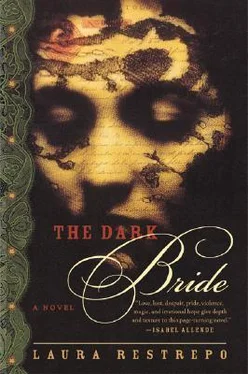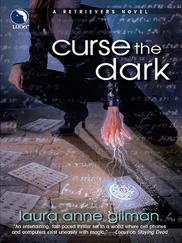“You’re too mean to die.”
“Listen carefully to what I am going to say. When are you going back down to La Catunga?”
“In about a month, I think.”
“Take this money to a kid they call the girl,” he said, and gave Payanés all the money from the only paycheck he had received. “She’s like my sister and she lives with her madrina , Todos los Santos. You tell her that Sacramento sent this to her so she’ll have money for food and can get away from the evil life. Then you look for Sayonara and say these words to her, just as I am saying them now: ‘Don’t worry, as soon as I get better I am going to marry you.’ ”
“You’re crazy, hermano . Are you turning into a savior of derailed women? What if they don’t want you to save them?”
“You just say what I told you; tell Sayonara that it’s a message from a man named Sacramento. That I know she’s suffering and as soon as I’m well I’m coming for her. Do you swear that you’ll do it?”
“I swear.”
Payanés left the convalescent pavilion deeply troubled after seeing his soul mate so lost. You’re screwed, hermano, he thought painfully, angrily, helplessly. Like the footsteps of a mammoth, the pounding of the drill bent on breaking the planet’s back echoed through the jungle, so no one heard him as he said out loud:
“They’re letting him die, the damned bastards.”
“Llegaron los peludoooos!”
Friday nights in La Catunga the call to arms spread from woman to woman: Llegaron ya los peluuudoooos! And so began, in dark splendor, the romantic costumed opera, opulent and miserable.
On weekdays, under the bright sun, in baggy, faded bathrobes, with bouncing breasts unrestrained by bras and the unkempt look of housewives, the women of Tora — when they weren’t breast-feeding babies — followed a routine of indiscriminately servicing rubber harvesters, jungle hunters, riverboat men, or merchants in brief, monetary episodes in bed that meant no more to them than scrubbing pots or feeding the chickens.
“What did you think about in the meantime?” I ask Todos los Santos. “I mean, while you were with them…?”
“I added up my accounts. I thought about the money they were going to give me and calculated what I could buy with it, depending on the price of potatoes, plantains, rent. While the man did his thing, I figured out my expenses.”
But Friday was Friday, and its arrival was evident in the air from the sound of crying babies whose diapers no one had changed, the hordes of wandering chickens stealing crumbs, and the fluttering of women humming love songs as they washed their hair in basins and spread their silk stockings out to dry in the sun. Dusk fell on the barrio, gilding the poverty, and the streets and alleys glowed with electric lights like a Christmas tree. Tired of crying, the children fell asleep in corners while their mothers gave themselves up, fluttering like black butterflies, to the ritual of dance, flirtation, and drinks.
Around seven the women would begin to arrive at the Dancing Miramar in groups of twos and threes, a few unaccompanied. All unrecognizable, vastly different from the way they appeared every day, their bodies transformed by a riot of color and anxious to escape their costumes of blue polyester, emerald green sateen, sunflower-hued rayon; neck and ears glittering with tricks of costume jewelry and fake diamonds; Elizabeth Arden lips bright red like the ace of hearts. Painted, dramatic, dolled up like transvestites — an eager, coquettish swarm of cats not yet fully tame. Or foxes, fully conscious of being putas , like a bullfighter is conscious of his being only when he steps into the ring, or a priest as he offers communion at the altar.
From that moment on life would be interwoven with the illusions of alcohol and darkness that magically lengthened eyelashes, sweetened the most unforgiving folds of skin, and poisoned the night with the smell of sewers and orange blossoms. The Victrolas would play tangos that made even the cat purr, and inside the Dancing Miramar, floating in smoke like a spaceship, love sprouted among the tiles and the ammonia in the back room.
Fragments of moonlight, like bits of broken glass, would collect in the corners among cigarette butts and empty bottles, and at the end of the spree, along with dawn, sadness would descend over the couples that lay naked on the beds and would clothe them with the caress of an angel.
At eight o’clock on another last Friday of the month, somewhere between stupefied and amazed, Payanés found himself seated at a table in the Dancing Miramar. This is what heaven must be like, he thought. It must be just exactly like this. Never in his life had he seen such an abundance of luxury and splendor. The red and black velvet, the semidarkness, the smoke that dazzled his eyes, the clinking of glasses, the delirium of women in brightly colored dresses, the smell of expensive perfume, the huge orchestra blasting the music of Pérez Prado. And above all, the satisfaction produced by the knowledge that in his pocket he had the money to pay for it all; he, Payanés, who had earned it fair and square. So this is the petrolero ’s compensation, he thought finally. He sat Molly Flan on his lap and ordered a bottle of whiskey.
On a platform, higher than everything in the room, unaware of everyone else, and protected by the cage of light cast upon her by a spotlight, danced Sayonara, her furious mane cascading down her back. She was wearing the silk blouse fastened with a tight row of buttons that passed over her heart and ascended to her neck, and the narrow skirt the color of mourning with the slit up the side, through which her dark leg showed: the tip of her foot, the shin, the calf, the knee.
“Is that her?” Payanés asked Molly Flan.
“That’s her. What does she have, anyway, that the rest of us don’t?”
“She’s skinny, but pretty,” said Payanés, as if to himself.
“She’s pretty, but skinny,” corrected Molly Flan.
Lost in her own world, as if floating in her dreams, Sayonara undulated in the stream of light. In the middle of the noise and the pressing crowd, the space she occupied seemed set apart like a sanctuary, inaccessible and inviolable, steeped in the air of another world like a lunar landscape.
“No one can find a way to penetrate that woman’s solitude,” said Payanés, thinking out loud.
Should I approach the platform and shout congratulations to her, that it’s her lucky day because my friend Sacramento sends her the good news that he’s going to marry her? He downed a burning shot of whiskey and decided not to say a word to her. That way I’ll save Sacramento from looking like a fool, he thought — at the same time, and more importantly, I’ll save myself from the same fate. He would take the envelope with the money to the girl, but he would play dumb about the message to this woman.
“Would it be breaking a promise to only half fulfill it?” he asked Molly, speaking loudly to make himself heard over the deafening silence that was created around the girl on the platform.
“What did you say?”
“Nothing.”
I have often asked myself the same question that Molly Flan asked — what did Sayonara have that the others didn’t? What was it, really, that transformed her at a certain moment in the history of La Catunga into a sort of cipher of that tight universe of oil workers, prostitutes, and love for pay? According to what several people told me, the answer could be traced to her defiant nature. They say that she had a peculiar ferocity that went beyond beauty and that attracted and intimidated. Certainly one could also talk about a notable hybrid vigor, stemming from the mixture of blood, that illuminated her youthfulness with the spirit and sparkle of a filly.
Читать дальше












